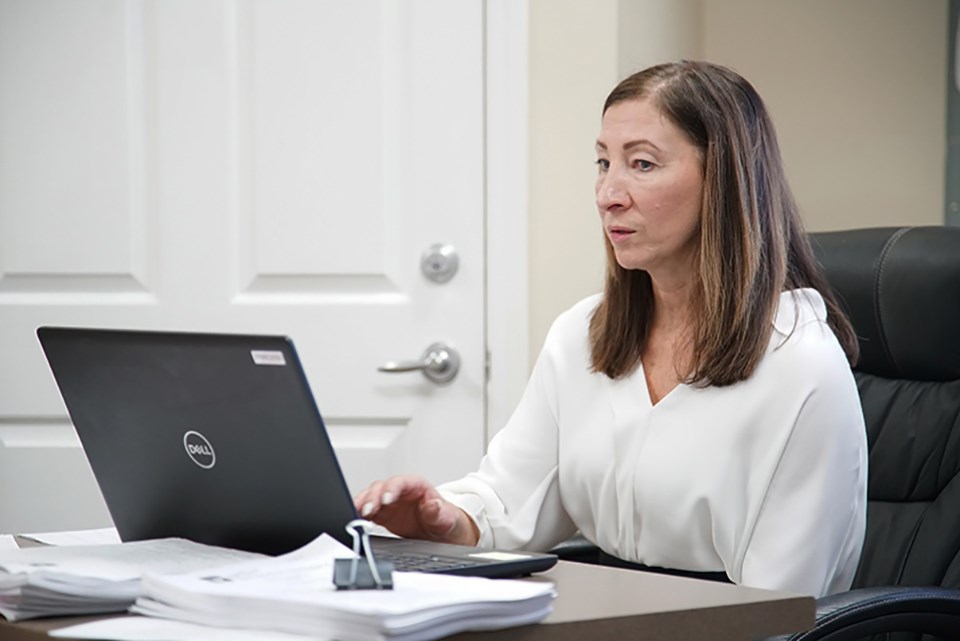qathet Regional District’s (qRD) third draft of its 2022 to 2026 financial plan has some modifications, taking into account capital cost reductions and the effect of increases in property assessments.
At the January 19 finance committee meeting, manager of financial services Linda Greenan outlined the draft, which will be presented and adopted by the regional board in February.
Greenan outlined 2022 community works fund allocations and expenditures. She said the regional district receives about $361,000 per year. She said as of January 1, 2022, there was about $1.4 million in the reserve and staff proposed allocations of $938,110 in 2022.
The capital plan for 2022 shows expenditures of $13,106,851 in regional services.
“The large part of that is the waste management resource-recovery centre,” said Greenan.
Of the funds to be expended, there is $3.1 million in grant money remaining, plus $11.3 million in borrowing, and $715,000 from reserves. Site closure and the resource-recovery centre amounts to $11,267,639 and construction of the waste transfer station is budgeted at $4,366,712.
In terms of regional parks, there is a $70,000 expenditure for the Haywire Bay sani-dump in the financial plan, with plans for a $35,000 grant, and a new well at Shelter Point Park, for $40,000.
In regional emergency services, there are two emergency supply containers, for $59,000, with a $38,000 grant.
The capital plan for electoral areas is $1,328,685. Savary Island Volunteer Fire Department’s new truck is budgeted at $400,000 and there is also wildlife fencing at Texada Island Airport, budgeted at $300,000, with $100,000 from the community works fund. Myrtle Point water system’s line reconnection is $260,000, with an application for a $169,000 grant.
Greenan recommended that prior-year surpluses be added to reserves for most services.
She said a number of reductions had been made in waste management, realizing savings of $216,778, which will save taxpayers approximately $2.84 per $100,000 of assessed value on their properties.
Requisition changes
Greenan then outlined a summary of the 2022 requisition change. She said for City of Powell River taxpayers, the total requisition had gone up $278,850, which is a 12.6 per cent increase over 2021. That means a tax rate of $62.60 per $100,000 of assessed value.
In Electoral Area A, the tax rate is $272.33 per $100,000 of assessed value.
In Electoral Area B, the tax rate is $183.41 per $100,000 of assessed value.
In Electoral Area C, the tax rate is $191.02 per $100,000 of assessed value.
In Electoral Area D, the tax rate is $196.78 per $100,000 of assessed value.
Annual cost per average home was also calculated by Greenan. In 2021, an average home in the regional district was $374,642.03 in assessed value. In 2022, the figure is $516,654.95 in assessed value.
“An average home has increased approximately 38 per cent from 2021 to 2022,” said Greenan.
In the City of Powell River in 2022, an average home would pay $323.42 in taxes to qRD. This is an increase of $52.08 more than 2021’s cost.
In Electoral Area A, the cost per average home is $1,407.03, which is a $122.14 increase over 2021.
In Electoral Area B, the cost per average home is $947.61, which is a $93.28 increase over 2021.
In Electoral Area C, the cost per average home is $986.89, which is a $101.24 increase over 2021.
In Electoral Area D, the cost per average home is $1,016.68, which is an increase of $151.36 over 2021.
Greenan said the final budget will be presented at the February 16 finance committee meeting, with the budget up for final adoption at the February 24 board meeting.
Director questions increases
Electoral Area D director Sandy McCormick said she appreciated the reductions staff proposed in waste management. She said, however, there was something she did not understand about the third draft. She said the reductions should reduce taxes.
“Reductions were supposed to bring taxes down and I’m curious to know why that hasn’t happened,” said McCormick.
Greenan said there was a substantial increase in the residential market, and when tax rates are being looked at, the regional district looks at residential tax rates per $100,000. She said business and industry did not have the same increases as the residential market.
McCormick said her question was about a comparison of draft two of the budget and draft three, which she was looking at during the meeting. She said draft two had taxes for an average Texada Island home listed as $943. The regional district had made some budgetary reductions since the second draft, but the new average tax was $1,016.69, according to McCormick.
“Why did the tax go up for an average home between draft two and draft three?” asked McCormick.
Greenan said it’s because there is such a drastic increase in the value of an average home.
“Values of average homes have increased 38 per cent,” said Greenan. “At draft two, we were looking at the 2021 tax roll values, an average value of 38 per cent less.”
McCormick then asked about contributions to reserves. She said it’s the right thing to do for asset management to reduce the reliance on a prior year’s surplus, but she was wondering if that could be slowed down, so rather than putting 100 per cent of surpluses into reserves, whether 50 per cent could be put into reserves and the other 50 per cent be used to offset a significant tax increase. McCormick made a motion to that effect but it was defeated.
The finance committee voted to receive the third draft of the 2022 to 2026 financial plan.



